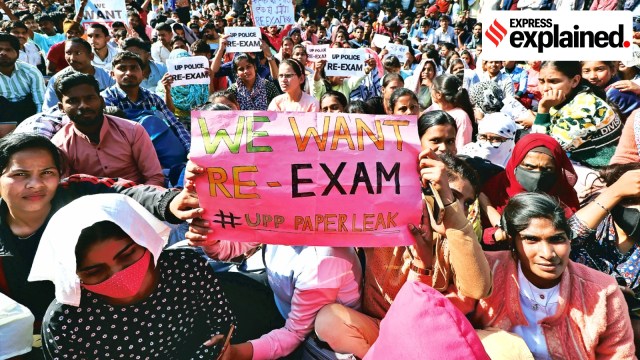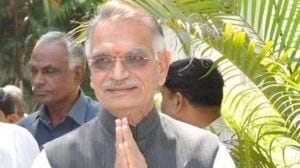How to secure entrance exams, stop leaks: expert panel’s ideas
The NEET-UG and UGC-NET paper leaks has put the functioning of the National Testing Agency (NTA), which conducts these exams, under the scanner.
 So far, the NTA has been conducting its exams in government-run schools and colleges, institutes recognised by the AICTE, and private centres where service providers conduct the exams
So far, the NTA has been conducting its exams in government-run schools and colleges, institutes recognised by the AICTE, and private centres where service providers conduct the examsA seven-member panel headed by former ISRO chairman K Radhakrishnan has made a set of 101 recommendations to the Ministry of Education for conducting national level entrance exams in a “transparent, smooth and fair” manner. The panel was constituted by the Ministry in June after the NEET-UG paper leak.
Here are some key recommendations made by the panel, categorised thematically.
Limit NTA’s scope
The NEET-UG and UGC-NET paper leaks has put the functioning of the National Testing Agency (NTA), which conducts these exams, under the scanner.
Noting that the NTA has “outstretched itself to accommodate diverse requests from many test indenting agencies” including taking up recruitment tests, the panel has suggested that the agency should primarily conduct entrance exams till its capacity is augmented.
Since it was established in 2018, the NTA has administered 244 tests, and the number of candidates registered for the tests has almost doubled from an average of 67 lakh per year during 2019-2021 to 122 lakh per year in 2022-23. In addition to entrance exams, the NTA currently conducts exams for recruitment in central universities.
The panel also noted the NTA’s “high dependence” on service providers and outsourced agencies to conduct exams. The panel has recommended that the NTA Director General be assisted by two additional directors general, and directors assigned to specific tasks, and said that the agency should be staffed with “domain-specific human resources” and a “leadership team with domain knowledge”.
Involve state, district officials
The panel has suggested involving state and district-level authorities “in the way elections are conducted”. Specifically, it has recommended setting up coordination committees at these levels comprising officials of the NTA, the National Informatics Centre (NIC), police, and the Intelligence Bureau. These committees would prepare strategies to ensure transparent and fair exams, identify testing centres, and ensure safe transportation of question papers with security from the police or paramilitary forces.
The panel has suggested that test centres be sealed in the presence of district administration and police before an exam, and that these centres be guarded till they are de-sealed for the exam — much like polling booths. The panel has also recommended CCTV monitoring of testing centres.
Like polls have presiding officers, the panel has suggested having a “presiding officer” from the NTA to be the overall in-charge of the test in a centre.
Improving testing process
The panel has recommended multi-session testing, spread over a few days to a couple of weeks. For NEET-UG, it has suggested multi-stage testing (like JEE Main and Advanced).
To prevent “suspicious and unusual” allocation of testing centres, it has suggested adherence to a testing centre allocation policy in which candidates will be assigned a testing centre in their district. Each district should have a testing centre, with mobile testing centres for rural or remote areas, according to the panel.
For pen-and-paper exams, the panel’s recommendations include setting more than three sets of question papers, and sending encrypted question papers to confidential servers at testing centres where they can then be printed. Another model suggested is delivering the question paper via computer to each candidate, with the candidates then recording responses in an OMR sheet.
To verify the authenticity of a candidate, the panel has suggested a “Digi-Exam” system, much like DigiYatra, where the primary data identifying the candidate is recorded at the application stage, and their biometrics are verified at the testing centre.
Long-term measures
The panel has suggested “harmonization and unification of tests” for admissions at the undergraduate level. This would include having a uniform eligibility and admission criteria, number of sessions, mode of testing, among other things.
The panel has also recommended the migration to “computer adaptive testing” — instead of the same set of questions being offered to everybody, in computer-adaptive testing a candidate is shown questions based on her ability, which is determined and updated based on responses during the test. With testees getting different combinations of questions, such a mode improves security and helps better assess individual capabilities.
Noting that computer-based tests (CBT) “has now become the preferred mode of examination and a sure way forward”, the panel has also recommended that the NTA collaborate with Kendriya Vidyalayas and Navodaya Vidyalayas to develop digital infrastructure that will allow them to serve as computer-based testing centres.
The panel has said that “a nationwide network of about 400-500 testing centres” be established “within a time frame of a year or so, which will provide about 2.0-2.5 lakh testing capacity for conducting CBT in one session nationwide”.
So far, the NTA has been conducting its exams in government-run schools and colleges, institutes recognised by the AICTE, and private centres where service providers conduct the exams. Setting up more computer-based testing centres is also expected to help lower the NTA’s reliance on service providers.
- 01
- 02
- 03
- 04
- 05






































